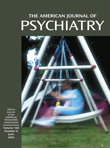Drs. Oquendo and Mann Reply
To the Editor: We found that 43% of the patients who attempted suicide during the follow-up period of our study met minimum standards for adequate pharmacotherapy for depression. Therefore, we do not believe that this finding means that optimal aggressive pharmacotherapy for depression does not reduce the occurrence of suicidal acts in those with major depressive episodes. Rather, we think that it reflects the problem of undertreatment more than treatment-resistant depression contributing to suicidal behavior and, in some cases, the effect of comorbidity with axis II cluster B personality disorder. As Dr. Wright points out, our literature review supported this interpretation of our data.
Dr. Wright objects to the choice of minimum adequate daily doses. He is referred to Sackeim et al. (1) as the basis for the medication standards used in our study. Dr. Wright also objects to our statement that most of our subjects received suboptimal antidepressant treatment. However, adequacy of treatment is related to dose and duration of treatment. Therefore, without both pieces of information, a complete judgment about the adequacy of the treatment cannot be made.
We agree with Dr. Wright that suicidality and depression are not synonymous. It is our opinion that in those at risk for suicidal acts, the presence of an episode of depression increases the risk for acting on suicidal thoughts. This view is supported by the increased odds (by sevenfold) of making a suicide attempt when a major depressive episode occurs during a follow-up period.
Of course, psychotropic interventions are not the only tool in the clinician’s armamentarium. However, they are a critical element in the continuation treatment of severe major depression in inpatients.
1. Sackeim HA, Prudic J, Devanand DP, Decina P, Kerr B, Malitz S: The impact of medication resistance and continuation pharmacotherapy on relapse following response to electroconvulsive therapy in major depression. J Clin Psychopharmacol 1990; 10:96-104Crossref, Medline, Google Scholar



